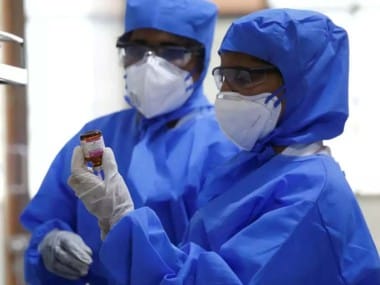We are just over 110 days into the COVID-19 pandemic. In this time, we have learnt an astonishing amount about the novel virus, but there are still some basic questions that reveal more uncertainty as we delve into them. Here are some of these deceptively straightforward questions and what latest research has to offer: [caption id=“attachment_8190811” align=“alignleft” width=“380”]  Representational image. PTI[/caption]
What is meant by ‘silent spreaders’ of COVID-19?
A development of much concern is the growing evidence of transmission from asymptomatic people. This means that people who display no symptoms, or very mild symptoms, unwittingly transmit the virus to others. Asymptomatic or pre-symptomatic carriers are challenging to detect unless there is blanket testing - something that remains a remote possibility in India. What percentage of the infected has no symptoms? This is where uncertainty comes in. According to Chinese data analysed by the World Health Organization (WHO), 25% of those who tested positive continued to show no symptoms on follow-ups. Data from the Diamond Princess, the cruise ship that was docked outside Japan following an outbreak, showed that 18% of those who tested positive had no symptoms. On the other hand, the US National Institute of Allergy and Infectious Diseases estimated that the figure may be as high as 50%. According to the Indian Council of Medical Research (ICMR), 80% of cases in the country are asymptomatic, which has made tracing and isolating challenging. There is a bright side: scientists are currently of the understanding that asymptomatic cases are often mislabelled and are in fact presymptomatic - many other case studies have shown that follow-ups after positive tests have revealed moderate symptoms. This may help in isolating the sick - to an extent. The next part of the puzzle is whether all asymptomatic people spread COVID-19 and if not, how many of them can. Again, there is not enough data at this time to answer this with confidence. Studies from China and Singapore suggest that the figure may be between 6% to 13%. Once serological (antibody) testing rolls out with more regularity, we may have more accurate answers.
Can you get reinfected by COVID-19?
Reports from South Korea and China last week of patients testing positive after getting discharged caused widespread panic. About 163 such cases were recorded in South Korea last week. However, experts have allayed some of these fears and said that it is unlikely that these people were reinfected - remnants of viral RNA that were not picked up in previous tests were maybe picked up this time around. It is unlikely that these trace amounts are enough to cause an infection. Further - and this is where it gets murkier - researchers who have worked with coronaviruses think it is unlikely that one can become infected so soon after recovering. It appears to them that immunity lasts for a year at least - this is contrary to observations of previous coronaviruses. However, we cannot say this with certainty yet. We don’t know to what extent, and for how long, immunity actually lasts. Again, widespread serological studies - and time - will tell us more.
How much has COVID-19 actually spread?
Experts world over do agree that COVID-19 is much more widespread than official measures suggest. For example, a modelling study published last week showed that as few as 6% of cases have actually been detected. Another study from California and published earlier this week showed that COVID-19 is maybe 50-85 times more prevalent than previously imagined. Looking at the deaths in an area may be a suitable guide for getting a handle on the prevalence rate. If we are to accept a mortality rate of 1% (which is heavily disputed as well) and that it takes three weeks for a person to die from the disease, then each COVID-19 death implies 100 cases in the weeks preceding it. This is still only an educated guess - these approximations will keep changing as new data emerge. For more information, read our article on WHO guidelines to better understand COVID-19_._ Health articles in Firstpost are written by myUpchar.com, India’s first and biggest resource for verified medical information. At myUpchar, researchers and journalists work with doctors to bring you information on all things health.


)

)
)
)
)
)
)
)
)



